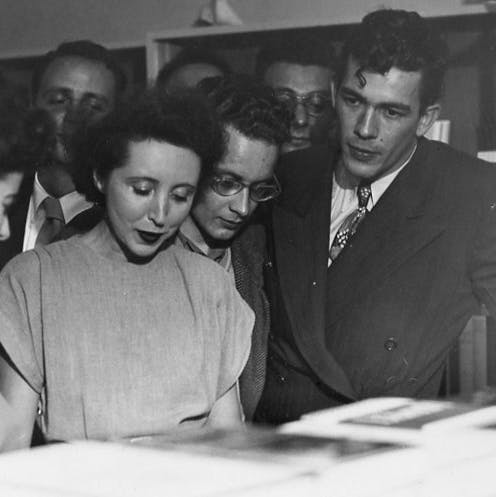journeying to the self with Anaïs Nin's sensual, transgressive diaries
- Written by Alice Gorman, Associate Professor in Archaeology and Space Studies, Flinders University

In a new series, writers nominate a book that changed their life – or at least their thinking.
As I combed the library shelves looking for something to read, a 17-year-old girl flush with freedom having escaped the confines of an Australian country convent school, a title caught my eye: The Early Diary of Anaïs Nin 1920-1923.
I too wrote diaries, laden with all the angst of a teenager uncertain of their place in the world.
In her musings on women and art, arising from furious arguments with Henry Miller (who stole her work and published it as his own), she maintained that women could create their own subjectivity[8] and elude the male gaze.
I read Nin’s diaries at various stages of my life. The early editions were heavily redacted. In the late 1980s, when I was in my twenties, the uncensored diaries started to be released.
Finally truths hinted at were revealed. And they were shocking.
Most notoriously, Nin seduced her own father and abandoned him in an act of revenge for the abandonment of her childhood. The volume “Incest”, published in 1992, is abhorrent at one level, and yet triumphant and transgressive in a way few writers can dare to be.
The critics, however, seemed to object more to the florid language she used to describe the affair than any moral implications.
Une être étoilique (a starry being)
Through Nin’s diaries, I became aware of a universe of other artists and thinkers. They included the experimental film maker Maya Deren[9]; creator of the Theatre of Cruelty Antonin Artaud[10], who aimed to disrupt the relationship between performers and audience with “organised anarchy”; and the psychoanalyst Otto Rank[11], one of Freud’s inner circle.
When I came to write my own book[12] about space archaeology, I wanted to explore the relationship between the inner worlds of human emotions and scientific conceptions of outer space.
I turned to Anaïs Nin for inspiration. In a speech given at Hampshire College in the US in 1972 – the year of the last human mission to the Moon, Apollo 17 – she said:
The wider our universe becomes due to science, and the furthest we go – we think we go so far when we go to the Moon – the nearer we need to come to the centre of ourselves in order to interpret this world, in order to find values, in order to give our lives meaning.
Nin was romantic, sensual, rebellious, mercurial, perceptive. She committed unpardonable sins yet scaled heights of creativity and imagination. She lived a life in which no pleasure or risk was repudiated.
Her diaries taught that the quality of a life can be an accumulation of small moments of beauty. That one could refuse to be tamed. That one could be many selves, each rich beyond reckoning.
References
- ^ The book that changed me: I'm a historian but Tony Birch's poetry opened my eyes to confronting truths about the past (theconversation.com)
- ^ Joaquin Nin (www.pcmsconcerts.org)
- ^ Hugh Guiler (www.nytimes.com)
- ^ Henry Miller (en.wikipedia.org)
- ^ a movie (en.wikipedia.org)
- ^ Playing and paying the whore in Little Birds (theconversation.com)
- ^ Rupert Pole (www.nytimes.com)
- ^ their own subjectivity (scholarworks.umt.edu)
- ^ Maya Deren (www.sensesofcinema.com)
- ^ Antonin Artaud (www.bl.uk)
- ^ Otto Rank (en.wikipedia.org)
- ^ my own book (www.newsouthbooks.com.au)

















